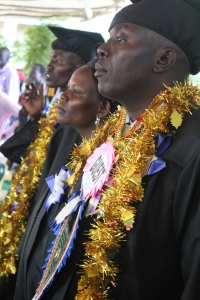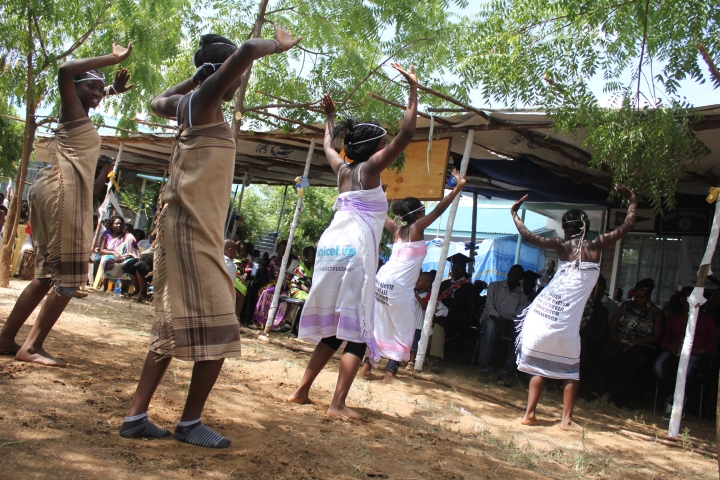The official ceremony and handing out of Diplomas was marked by delicious meals and entertainments at Arrupe Learning Centre in Kakuma
Jesuit Commons: Higher Education at the Margins (JC-HEM) is an online learning program offered by the Jesuit Refugee Service (JRS) to provide tertiary education to refugees. It provides a three-year Diploma in Liberal Studies focusing on the areas of: Humanities, leadership, business studies and communication. “The needs assessment was conducted in 2009 and the first intake in liberal studies was in 2010 where 27 students were able to graduate,” Elizabeth Lock, JC-HEM Coordinator, JRS Kakuma, told Kanere.
On 23rd September, the official ceremony of 2010 Cohort Diploma Graduation took place, a colorful event attended by invited members of the refugee and host communities, JC-HEM graduates, families, friends, and JC-HEM community representatives including officials from the American University of Regis and Gonzaga, which awards the degrees.
JC-HEM being the only opportunity for tertiary level studies means a great blessing in the heart of refugees who desired higher education. “Being a pioneer in the JC-HEM program, I can challenge you that the liberal system of education has helped us to discover a body of knowledge as a result of learning different courses,” said a 2010 cohort student leader, reading out a speech.
Researchers have examined the academic results of students who have undertaken on-line courses compared to those that are taking the same courses but conducted in a more traditional approach. The thematic approach has increased a more social interaction and shared value system.
The students have encountered challenges like time management, shortage of books, environmental challenges, and failure of the network system leading to late submission of assignments. “The three years online platform was not easy, but through struggle, commitment and final interests from students we have made it to the end,” said James Allam, one of the graduates.
Impact of the JC-HEM Program
Kakuma being an old established camp, located in a remote and isolated area, has largely lacked higher education for its youths after they complete secondary school. Even though the desire to join higher education remains high, people are not able to acquire further education due to difficulties in obtaining finance.
Before the start of the JC-HEM Program, the University of South Africa (UNISA) provided refugees in Kakuma with tertiary education through distance learning for the Degree Programs through the JRS, where the fees are covered. Postal services, examinations, IT access and library studies are provided through the JRS.
Many refugees who are undergraduates and college dropouts who had been forced into exile have benefited from limited chances. However, UNISA changed its structure after JRS brought up the online system, as they could not cater for the increasing number of students who enrolled in liberal studies.
The online program has increased writing and communication skills for the students; there’s been change in language behaviors and more implicit socialization as well as enabling students to compete in the job market and with others having the same qualification.
In JC-HEM, there are fifteen courses that are offered in two clusters. The first cluster comprised ten different courses in Liberal Arts while the last five consisted of specialization areas that focus on social work. “There’re many courses offered online, after three years, it becomes real to accomplish. Despite a lot of burning heat, I made it here,” said Ahmed Biwaye.

According to JC-HEM officials, the online courses in Liberal Studies are conducted both in Kakuma and Dzaleka refugee camp in Malawi. The classes begin at the same time and maintain the same system of learning. The program is expected to continue for the future in both camps. “The pilot project ends in 2014 but plans are under way to find what’s the most rational way to move forward,” Lock added.
The next intake for the Diploma in Liberal Studies will begin in May 2014 when applications are accepted. However, classes will start in September 2014.

